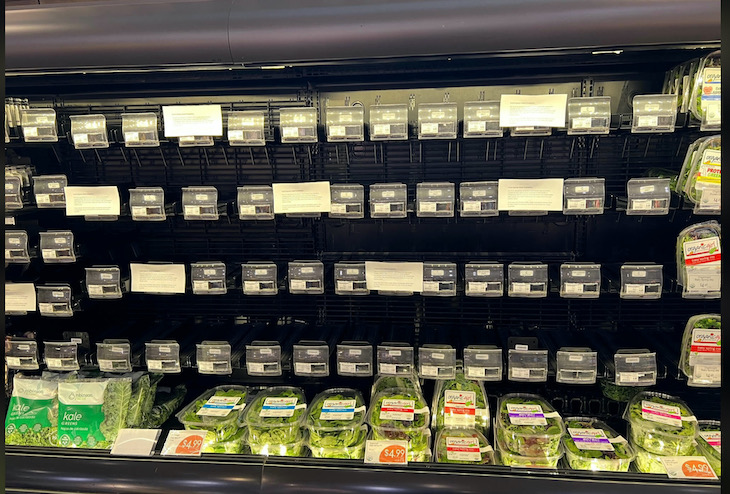With four leafy greens outbreaks currently ongoing in the United States at this time (and several recalls), how do you protect yourself against foodborne illness? The CDC has some answers.

From 2014 to 2018, there were 51 foodborne illness outbreaks linked to leafy greens. Five of those were multistate outbreaks reported to the public. (Most foodborne illnesses are not part of a recognized outbreak, and many are not multistate so the CDC does not cover them.) In 2019 to 2021, there were nine multistate outbreaks linked to leafy greens. And just in the last week of 2021, three of those outbreaks were announced.
The current outbreaks are:
- Josie’s Organics baby spinach E. coli outbreak. This outbreak, with illness onset dates ranging from October 13, 2021, to October 27, 2021, has sickened at least 14 people in nine states. Three people have developed hemolytic uremic syndrome (HUS), a type of kidney failure.
- Dole bagged salads Listeria monocytogenes outbreak. This outbreak has sickened at least 16 people in 13 states. Two people have died. Illness onset dates range from August 16, 2014 to October 17, 2021. A recall has been issued.
- Fresh Express bagged salads Listeria monocytogenes outbreak. At least ten people are sick in eight states. All ten patients have been hospitalized and one person has died. Illness onset dates range from July 26, 2016 through October 19, 2021. A recall has been issued.
- Simple Truth Power Grens and Nature’s Basket Organic Power Greens E. coli O157:H7 outbreak has sickened at least 13 people in six states. One person has developed HUS. In this outbreak, illness onset dates range from November 27, 2021 to December 9, 2021. No recall has been issued because officials believe that no product is available for sale.
Even with these outbreaks, it’s important to understand that millions of pounds of leafy greens are eaten even day in the U.S. without making people sick. Still, to those who have gotten sick, and their families, this statistic doesn’t mean much.
Protect Yourself
So how can you protect yourself? Leafy greens, as a raw agricultural product, are often contaminated with dangers pathogens. Washing them will not remove all of those bacteria.
First, always pay attention to recall notices and outbreak investigation notices. The FDA and CDC update those notices often.
If you or a member of our family is in a high risk group for serious complications from foodborne illness, such as the elderly, the very young, someone with a chronic illness or compromised immune system, or someone who is pregnant, it may be a good idea to avoid eating leafy raw greens completely. You can serve cooked greens, such as spinach or kale, instead.
If you still choose to eat raw greens, follow a few rules. First, do not rewash prewashed bagged greens. You may contaminate them with bacteria in your sink or kitchen. Don’t wash them if the package says: Ready to eat, triple washed, or no washing necessary. All other leafy greens should be thoroughly rinsed and, preferably, dried with a clean towel or paper towels.
To wash greens, first wash your hands thoroughly with soap and water. Get rid of any torn or bruised or cut leaves. Remove the outer leaves from the heads of cabbage and lettuce. Rinse the leaves under running water. Use your hands to gently rub them. Then dry them.
Do not soak leafy greens in your kitchen sink, because bacteria in the sink can contaminate them. If you soak them in a bowl, bacteria that may be on one leaf can contaminate the rest.
While kitchen vinegar or lemon juice are recommended by some, thee CDC is not aware of any studies that show they are any better than running water. Vegetable rinses will not kill bacteria. And do not use a bleach solution or disinfectant on produce.
Also make sure that you buy leafy greens that aren’t damaged. Refrigerate pre-cur produce at the store and at home. Buy bagged salads with expiration dates as far into the future as you can. Keep produce separate from raw meat, poultry, seafood, and eggs at all times. Use separate cutting boards for meat and poultry and produce. Refrigerate cooked or cut produce, including salads, within two hours.
If you did buy recalled leafy greens, discard them immediately in a sealed bag in a secure trash can, or take them back to the store. Clean your fridge with a mild bleach solution, then wash your hands well with soap and water.
And you should know that even though hydroponic greens aren’t exposed to the elements like traditionally grown produce, they can still be contaminated with pathogens. Organic produce is no safer than conventionally grown. You can also get sick from homegrown produce, especially if it accessed by animals or storm runoff.
It’s also important to know the symptoms of food poisoning, especially listeriosis, E. coli, and HUS, a complication of an E. coli infection that is a kind of kidney failure. With these tips, paying attention to the FDA, and some smart decisions, you can protect yourself and your family against these four leafy greens outbreaks and those that will occur in the future.

If you or a loved one have been sickened with a Listeria monocytogenes or E. coli infection after eating leafy greens, please contact our experienced attorneys for help at 1-888-377-8900 or text us at 612-261-0856. Our firm represents clients in lawsuits against grocery stores and food processors, and families in wrongful death cases




